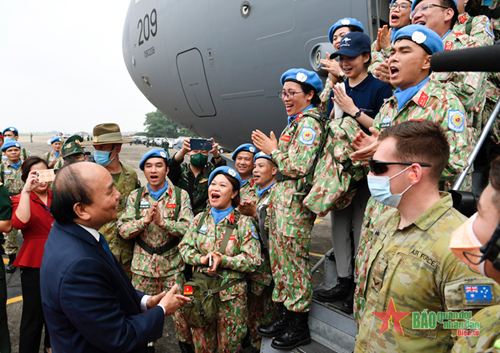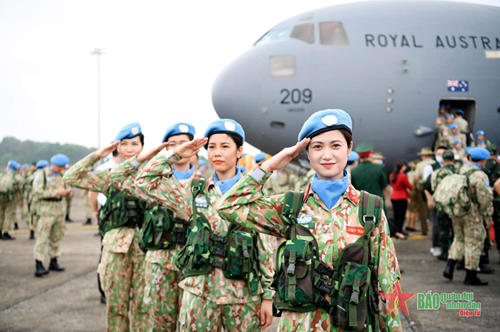The diplomat has written an article for the People’s Army Newspaper, pointing out highlights of the 45 years of Vietnam’s entry to the U.N and what Vietnam should do to make more contributions to the organization.
The diplomat recalled that 45 years ago, the war in Vietnam freshly ended. Vietnam enjoyed peace and national reunification. At that time, Vietnam was a symbol of the national liberation movement, gaining a lot of love from mankind. However, besides the joy of independence and national reunification, Vietnam was facing many difficulties. The country had just come out of the war. Its economy and technology were outdated. In terms of foreign affairs, Vietnam was still besieged and embargoed by many countries. Therefore, the U.N.’s officially admitting Vietnam as a member was of great significance.
He drew some meaningful points as follows:
Firstly, it was the recognition of a new Vietnam with peace, unity, and independence, and participation in international mechanisms though the country was under embargo. It was also the result of countries’ wide movements in support of the just cause of Vietnam. The official entry to the U.N. – the largest global organization opened a new chapter in Vietnam's relations with the world, thereby enabling Vietnam not only to make use of international help for the country's reconstruction, but also increasingly participate and contribute more to the common work of the U.N. and the world.
Amb. Vinh recalled that after issuing a resolution on admitting Vietnam to the U.N., the organization also issued resolutions to call for more support for Vietnam’s national reconstruction and hunger elimination and poverty reduction.
    |
 |
|
State President Nguyen Xuan Phuc (left) bids farewell to members of Vietnam's Engineering Company Rotation 1 and Level-two Field Hospital Rotation 4 before they left Noi Bai International Airport for U.N. peacekeeping missions. |
From 1977 to late the 1980s, when Vietnam was under embargo, the U.N. gave the most assistance to Vietnam, ranging from settlement of war legacy to hunger elimination and poverty reduction, and national development. In the 1990s, the U.N. was among the leading organizations supporting Vietnam to make policies and develop action plans on renewal, economic and legal system reform, and develop and integrate into international community.
Secondly, apart from achievements in renewal process, development and international integration, Vietnam has accompanied and made effective contributions to the U.N. and the world’s common duties. The most typical example is Vietnam's engagement in planning and implementing the U.N.'s Millennium Development and Sustainable Development to 2030 Goals, becoming an example of cooperation and effective implementation of the U.N.’s action programs. In addition, Vietnam has actively participated in U.N.’s cooperation programs on environment, climate change, disease prevention and control, poverty alleviation and hunger elimination, and helping disadvantaged people. Vietnam has also actively coordinated with the U.N. to implement trilateral cooperation initiatives to help African countries in agriculture, food, education, health care, and poverty alleviation.
Thirdly, Vietnam has always upheld and actively contributed to strengthening the principles of the U.N. Charter and international law, for peace, friendship, cooperation and common development of all peoples. This is also a consistent principle in the country’s foreign policy. Vietnam strongly supports the U.N.'s efforts on promotion of cooperation, dialogues, peaceful settlement of disputes, nuclear disarmament, or support and promotion of the culture of peace in international relations.
When joining the U.N. Security Council, Vietnam has launched many important initiatives, which have received high support and consensus of U.N. members, such as upholding the U.N. Charter and multilateralism, helping to clear landmines, protecting women, and children, and essential civilian facilities during war. Additionally, Vietnam has been actively participating in U.N. peacekeeping operations, which are highly appreciated by the U.N. and other countries.
Fourthly, Vietnam has gradually joined and increasingly promoted its role in the U.N.'s leading agencies. Since the second half of the 1990s, Vietnam has held high positions in the U.N. Development Program (UNDP), the U.N. Children's Fund (UNICEF), the U.N. Educational, Scientific and Cultural Organization (UNESCO), the International Atomic Energy Agency (IAEA) and the Human Rights Council. The country has twice acted as a non-permanent member of the Security Council, a U.N.’s key agency responsible for peace and security in terms 2008-2009 and 2020-2021. Taking these roles, Vietnam has actively contributed to the common work, thereby enhancing the country’s position and prestige at the U.N. and in the international arena.
Fifthly, Vietnam has upheld the principles of the U.N. Charter and other U.N.’s important documents, such as the Convention on the Law of the Sea (UNCLOS) 1982, in order to contribute to regional peace, security, cooperation and development. Particularly, Vietnam has actively promoted cooperation between the U.N. and ASEAN in all areas ranging from peace and security, development cooperation, to response to global challenges, such as environment pollution, climate change, and epidemics. Regarding the East Sea (South China Sea) issue, Vietnam always emphasizes respect for international law and UNCLOS 1982 to ensure peace, stability, security, safety, freedom of navigation, and legitimate rights and interests of coastal countries, peaceful settlement of disputes and no further complication of the situation. This is also ASEAN’s common standpoint and principles.
Sixth, it can be seen that over the past 45 years, Vietnam has always harmoniously combined assurance of national interests (independence, self-reliance, international support) with active and responsible contributions to the U.N.’s common goals. It is part of the country’s consistent foreign policy of independence, self-reliance, multilateralization, diversification, and being a friend and responsible member of the international community. That is also a lesson drawn by Vietnam during its participation in the U.N. and international and regional integration. This has helped enhance Vietnam’s prestige, create new position for the country and boost international friends’ trust in and high appreciation for Vietnam.
With high sense of responsibility, Vietnam has joined hands in developing international agendas based on national interests and the principles of international law to create an equal playground between major and small powers, for peace and security, and development.
Seventh, in the coming time, with new conditions and position, Vietnam must further promote its participation and contributions at the U.N. and in the international arena. Accordingly, Vietnam needs to continue to promote the aforementioned foreign policy principles, both to serve the country's development aspirations towards 2030 and 2045 and to continue to further promote its proactive role in the world’s common affairs, for peace, security, development, cooperation and handling of global challenges.
According to former Deputy FM Vinh, what Vietnam should do is the continuity of upholding U.N.’s role, multilateralism, international cooperation, respecting international law, and actively contributing to world agendas, international principles, cooperation frameworks with countries within the U.N. framework and through regional mechanisms. As Vinh wrote, this will help Vietnam make a substantial and effective contribution to international cooperation, ensuring international law, thereby contributing to shaping international and U.N. regulations and rules.
Also in the writing, diplomat Vinh noted the 13th Party National Congress’s defining Vietnam’s foreign policy’ major duties of ensuring the highest national interests on the basis of basic principles of international law, equality and mutual benefit. The congress also specifies the pioneering role of foreign policy in building and maintaining a peaceful and stable environment, mobilizing external resources for development, and enhancing the position and prestige of the country.
    |
 |
|
Female officers of Engineering Company Rotation 1 |
To this end, the comprehensive and modern diplomacy must be combined in all channels: party diplomacy, state diplomacy, and people-to-people diplomacy. In addition, Vietnam continues to implement extensive and comprehensive integration in all fields with due attention paid to the areas Vietnam has the strength and capability to participate to take advantage of the international environment for peace, security and development of Vietnam while further contributing to the development of agendas and common areas of international and regional cooperation.
As Ambassador Vinh suggested, to deepen its substantive relationship with other countries to serve the country's development, Vietnam needs to closely follow the Party's foreign policy at the 13th Party National Congress, target higher quality integration to achieve its economic development goals in the new period, especially take advantage of scientific and technological advances, supply chains and division of high-quality labor to serve economic development.
The diplomat suggested Vietnam continue to develop current cooperation frameworks with other countries and international organizations in a stable, long-term, practical, effective and mutually-beneficial manner. To do it, the good combination among external channels in all fields is needed. In other words, it needs the engagement of not only the Ministry of Foreign Affairs, but also all ministries and departments.
Former Deputy Foreign Minister Pham Quang Vinh also stressed the importance of the strategic forecasting and personnel work. According to him, in the context that the world is moving deeply and complexly, and challenges and opportunities are intertwined, it is necessary to improve the quality of forecasting to give good advices and recommendations on policies and challenge handling to avoid missing opportunities. He also emphasized the improvement of the contingent of cadres in terms of knowledge, bravery, strategy, external relations skills and technology updates.
Translated by Mai Huong